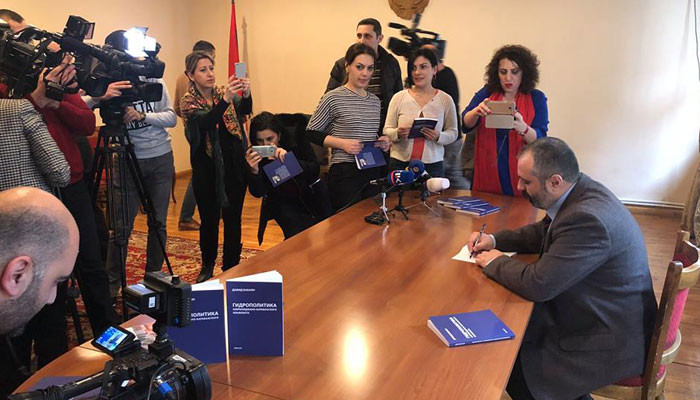Presentation of “Hydro policy of the Azerbaijani-Karabagh conflict" hold in Yerevan
 3358 Friday, 01 February, 2019, 13:30 My new book, “HYDRO POLICY OF THE AZERBAIJANI-KARABAGH CONFLICT” was presented in Yerevan. Traditional threats to mankind, for example, threats of war, will not be the primary challenges to the security of countries and nations in the 21th century. Today such safety concerns as environmental security, and most particularly, water security, are gradually becoming very much urgent. The Artsakh Republic also faces such problems, which are further exacerbated given that the Azerbaijani-Karabagh conflict has not been settled. Accordingly, in searching ways to settle the Azerbaijani-Karabagh conflict, guaranteeing the full and effective water security for Artsakh is a strategic imperative is a must. The monograph consists of six chapters. Chapter 1, “Global Hydro-Policy in Contemporary International Relations”, addresses such issues as water problem and water supply deficit, water conflicts, water security, threats of hydro-terrorism and human-induced disasters. Examples from various regions of the world (the USA, Europe, the Middle East, Crimea, Central Asia, and the Far East) have been presented and touched upon there. Chapter 2, “The Azerbaijani-Karabagh Conflict. Ethno-Political Aspects”, looks at various aspects of the Azerbaijani-Karabagh conflict and stresses the imperative of ensuring comprehensive security of the republic, eliminating every possibility of Azerbaijani adverse influence on Karabagh, the existence of which determines the future of the Armenian statehood at large. Chapter 3, “Water resources of Artsakh” provides a survey of main water resources of the Artsakh Republic – rivers, lakes, reservoirs, underground water sources. Chapter 4, “Azerbaijan’s Hydro Policy towards the former Nagorno Karabagh Autonomous Oblast or Region (NKAO) in 1921-1988”, deals with issues on the Azerbaijani hydro-policy pursued towards the former Nagorno Karabagh Autonomous Oblast. It consists of three subchapters – “Hydro Policy of Azerbaijan Comprehensive Restriction of the NKAO’s Socioeconomic Development”, “Hydro-Demographic Policy of the Official Baku in the Former NKAO”, and “Hydro-Terrorism” respectively. Chapter 5, “Strategic Significance of the Water Resources in the Economic Development and State-Building of the Artsakh republic”, highlights the importance of water resources for the Republic of Artsakh. Within this context, a range of territories, most particularly, the Kashatagh and Shahoumyan (Karvachar) regions of Artsakh play a crucial role. The Shahoumyan (Karvachar) region is also a key component of the water security for the Republic of Armenia, especially in view of the fact that the Arpa and Vorotan rivers, which, among other things, are of paramount importance in saving the main water source of Armenia, Lake Sevan, spring in the Karvachar region. And finally, prospects for mutually beneficial cooperation between Artsakh and Armenia, as two neighboring states, are discussed in the Chapter 6. The timeframe of the research on Azerbaijani-Karabagh relations with regard to water resources covers two phases. The first phase covers the hydro policy of Azerbaijan towards Nagorno Karabagh in the Soviet era. It culminated in the late 1960s with Heydar Aliev’s accession to power. Since the beginning of the Aliev era, the official Baku openly pursued the policy of hydro-pressure towards the former NKAO as well as waged the policy of hydro-demography, i.e. demographic dominance over the sources of the most important rivers in the region. Over the same period, the Aliev regime also embarked on the policy of hydro terrorism in the former NKAO. The second phase involves the current situation related to water issue in the NKR. We could claim that after the end of military confrontation with Azerbaijan, the NKR has secured itself of the vulnerability of external influences and manipulation of its water resources. As of present, the Republic of Artsakh could claim to be one of the few countries in the world which, being richly endowed with water resources, has complete control over virtually all water arteries flowing through its territory. The book is based on the sources and research in Armenian, Russian, English and Azerbaijani languages through access to archival material, official documents, making use of published sources (books, forum proceedings, media publications), online media, as well as data collected during numerous private meetings with the responsible officials of the Artsakh Republic water management system, the ministry of healthcare, the ministry of agriculture, the ministry of nature protection and natural resources, meetings with the citizens having suffered as a result of the hydro policy pursued by official Baku. There is also a broad array of official documents and statements, in particular, resolutions and official remarks by the NKR President, premier, heads of ministries and other structures, the NKR government decrees, the NKR laws on “Food Security and Nature Protection”, the NKR Water Code, statistical compilations of the NKR, as well as official statements made by Azerbaijani authorities. |

«Himches gidacal». Nairyan vocal Ensemble
47526.02.2026, 22:33
Head of France's Versailles Palace to take over Louvre
118325.02.2026, 14:55
Henry VIII's love token secured by British Museum after centuries lost
502911.02.2026, 01:01
Netherlands returns 3,500-year-old looted sculpture to Egypt (video)
535908.02.2026, 19:12
Fifty-year restoration of Sainte-Chapelle's monumental stained glass inches closer to completion (photo)
398704.02.2026, 22:57
First lady’s film ‘Melania’ racks up biggest opening for a documentary in a decade
789301.02.2026, 23:32
BAFTA 2026 nominations
924727.01.2026, 19:38
2026 Oscar Nominations: See the Full List
962723.01.2026, 00:33
